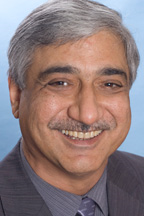
|
Keynote Speaker:
Ismail Khalil
Johannes Kepler University Linz, Austria
|
Biography:
Ismail Khalil is the deputy head of the institute of telecooperation, Johanes Kepler University Linz, Austria, since October 2002 and Adjunct Full Professor at Faculty of Science and Technology (FST), Syarif Hidayatullah State University Jakarta, Indonesia. He is the president of the international organization of Information Integration and Web-based Applications & Services (@WAS). He holds a PhD in computer engineering and received his habilitation degree in applied computer science on his work on agents interaction in ubiquitous Environments in May 2008. He currently teaches, consults, and conducts research in Mobile Multimedia, Cloud Computing, Agent Technologies, and Web Intelligence and is also interested in the broader business, social, and policy implications associated with the emerging information technologies. Before joining Johannes Kepler University of Linz, he was a research fellow at the Intelligent Systems Group at Utrecht University, Netherlands from 2001-2002 and the project manager of AgenCom project at the Software Competence Center Hagenberg Austria from 2000-2001. Dr. Khalil has authored around 150 scientific publications, books, and book chapters. He serves as the Editor-in-Chief of 4 international journals and 2 books series. His work has been published and presented at various conferences and workshops.
|
Title: Big Data for Smart Healthy Ageing
|
Abstract: In February 2011, Watson (IBM super computer) managed to beat two past grand champions on the TV quiz show Jeopardy!. Watson was able to answer questions that require intelligence when done by humans. This marked the first machine to pass the Turing test and started a new era of computing called cognitive computing where computers (modeled after the human brain) learn and interact naturally with people in order to augment what either humans or machines could do on their own. Google, Amazon, Facebook, etc., using big data technologies, smart machine learning, cognitive computing, NLP and AI algorithms were able to tap into our intensions by predicting what we click, buy, like, dislike, shop, surf, etc.,.
This marked the era of smart Web or data intelligence where Turing test is reversed and machines now try to figure out who we are, our information needs, our behavioral patterns, the activities we are engaged in and our goals. Together with the torrents of data we leave behind us every time we communicate with the digital eco-system, a new era of human-machine cooperation is starting that gives us millions of potential insights into user experience, personal tastes, and human behavior.
In this talk, we are going to illustrate, through motivating cases, examples, and research directions, the main characteristics of this era and how it can transform the way we interact for smart health and assisted living / care to ultimately improve the quality of ageing population lives and gain valuable insights into their affective, mental and physical states.
|
|